NCERT Solutions for Class 10 Maths Chapter 11 Areas Related to Circles
From the wheels we ride to the plates we use, areas of circles are everywhere, and math shows us how to measure them. Have you ever wondered how one determines the amount of material required for a round tablecloth, or how engineers calculate the area of a circular stadium? Areas related to circles are used to solve problems in real life involving circles. According to the latest NCERT syllabus, this chapter covers the basic concepts of calculating the circumference, area, and components of a circle, including sectors and segments. They find extensive usage in fields such as architecture, sports, and engineering, and therefore are extremely practical to use in everyday life. The primary benefit of using NCERT Solutions for Class 10 is that they offer clear explanations and accurate answers, facilitating a deeper understanding.
This Story also Contains
- NCERT Solutions for Class 10 Maths Chapter 11 Areas Related to Circles: Download Free PDF
- NCERT Solutions for Class 10 Maths Chapter 11 Areas Related to Circles (Exercise)
- Areas related to Circles Class 10 NCERT Solutions: Exercise-wise
- Class 10 Maths NCERT Chapter 11: Extra Question
- Areas Related to Circles Class 10 Chapter 5: Topics
- Class 10 Maths Chapter 11 NCERT Solutions: Important Formulae
- Why are Class 10 Maths Chapter 11 Areas Related to Circles question answers important?
- NCERT Solutions for Class 10 Maths Chapter Wise

Defining the area of a circle means capturing the space within its boundary, turning curves into clear measures. Our experienced subject matter experts at Careers360 design these NCERT solutions for class 10 Maths to offer a systematic and structured approach, along with step-by-step solutions to important concepts. This helps students prepare well for exams and gain knowledge about the natural processes happening around them through a series of solved questions provided in the NCERT textbook exercises. It covers questions from all the topics and will help you improve your speed and accuracy. Many teachers recommend NCERT Solutions because they closely match the exam pattern. Find everything in one place – NCERT Books, Solutions, Syllabus, and Exemplar Problems with Solutions – in this NCERT article.
NCERT Solutions for Class 10 Maths Chapter 11 Areas Related to Circles: Download Free PDF
Careers360 brings you NCERT Solutions for Class 10 Maths Chapter 11, carefully prepared by subject experts to simplify your studies and help in exams. A downloadable PDF is available — click the link below to access it.
NCERT Solutions for Class 10 Maths Chapter 11 Areas Related to Circles (Exercise)
Here are the NCERT Class 10 Maths Chapter 11 Areas Related to Circles question answers with clear, detailed solutions.
| Areas Related to Circles Class 10 Question Answers Exercise: 11.1 Page number: 158-159 Total questions: 14 |
Q1: Find the area of a sector of a circle with radius 6 cm if the angle of the sector is 60°.
Answer:
We know that the area of a sector having radius r and angle θ is given by:-
$Area = \frac{θ}{360°}×πr^2$
Thus, the area of the given sector is:-
= $\frac{60°}{360°}×π×6^2$
= $\frac{132}{7}\ cm^2$
Q2: Find the area of a quadrant of a circle whose circumference is 22 cm.
Answer:
We are given the circumference of the circle.
Thus,
2πr = 22
$r = \frac{11}{π}\ cm$
Also, we know that the area of a sector is given by :
$Area = \frac{θ}{360°}×πr^2$
It is given that we need to find the area of a quadrant, thus θ = 90°
Hence, the area becomes:-
= $\frac{90}{360°}×π(\frac{11}{π})^2$
= $\frac{77}{8}\ cm^2$
Answer:
The minute hand rotates 360° in one hour.
We need to find a rotation in 5 minutes. :-
= $\frac{360°}{60}×5 = 30°$
The area of the sector is given by :
$Area = \frac{θ}{360°}×πr^2$
$Area = \frac{30}{360°}×π ×14^2$
$Area= \frac{154}{3}\ cm^2$
Hence, the area swept by the minute hand in 5 minutes is $\frac{154}{3} cm^2$.
Q4: A chord of a circle of radius 10 cm subtends a right angle at the centre.
Find the area of the corresponding : (i) minor segment
Answer:
The angle in the minor sector is 90°.
Thus, the area of the sector is given by:-
$Area = \frac{θ}{360°}×πr^2$
$Area = \frac{90°}{360°}×π×10^2$
$Area = \frac{1100}{14} cm^2$ = 78.5 cm2
Now the area of a triangle is:-
$Area = \frac{1}{2}bh = \frac{1}{2}×10×10$ = 50 cm2
Thus, the area of the minor segment
= Area of the sector - Area of a triangle
= 78.5 − 50 = 28.5 cm2
Q4: A chord of a circle of radius 10 cm subtends a right angle at the center.
Find the area of the corresponding : (ii) major sector. (Use π = 3.14)
Answer:
The area of the major sector can be found directly by using the formula :
$Area = \frac{θ}{360°}×πr^2$
In this case, the angle is 360° - 90° = 270°
Thus, the area is: -
= $\frac{270°}{360°}×π×10×10$
= $\frac{3300}{14}$ = 235.7 cm2
Q5: In a circle of radius 21 cm, an arc subtends an angle of 60° at the center.
Find: (i) the length of the arc
Answer:
The length of the arc is given by:-
Length of arc = $\frac{θ}{360°}×2πr$
= $\frac{60°}{360°}×2×π×21$
$= 22\ cm$
Hence, the length of the arc is 22 cm.
Q5: In a circle of radius 21 cm, an arc subtends an angle of 60° at the center.
Find: (ii) the area of the sector formed by the arc
Answer:
We know that the area of the sector is given by:-
$Area = \frac{θ}{360°}×πr^2$
= $\frac{60}{360°} ×π×21^2= 231\ cm^2$
Thus, the area of the sector is 231 cm2.
Q5: In a circle of radius 21 cm, an arc subtends an angle of 60° at the centre.
Find: (iii) area of the segment formed by the corresponding chord
Answer:
For the area of the segment, we need to subtract the area of the triangle attached from the area of the arc.
Thus, consider the triangle:-
It is given that the angle of arc is 60°, or we can say that all angles are 60°
(since two sides are equal). Hence, it is an equilateral triangle.
Area of the triangle is:-
= $\frac{\sqrt 3}{4}×a^2$
= $\frac{\sqrt 3}{4}×21^2$
= $\frac{441\sqrt3}{4}$
Hence, the area of the segment is:-
= $(231 − \frac{441 \sqrt3}{4}) cm^2$
Answer:
The area of the sector is :
$Area = \frac{θ}{360°}×πr^2$
$Area = \frac{60°}{360°}× π × 15^2$
= 117.85 cm2
Now consider the triangle; the angle of the sector is 60°.
This implies it is an equilateral triangle. (As two sides are equal, they will have the same angle. This is possible only when all angles are equal, i.e., 60°.)
Thus, the area of the triangle is:-
= $\frac{\sqrt 3}{4}×15^2$
$= 56.25\sqrt{3} = 97.31\ cm^2$
Hence area of the minor segment: = $117.85 − 97.31 = 20.53\ cm^2 $
And the area of the major segment is :
=$πr^2 − 20.53$
$= π×15^2 − 20.53$
$ = 707.14 − 20.53$
$ = 686.6\ cm^2$
Answer:
For the area of the segment, we need the area of the sector and the area of the associated triangle.
So, the area of the sector is :
= $\frac{120°}{360°}×π×12^2$
= $150.72\ cm^2$
Now, consider the triangle:-
Draw a perpendicular from the centre of the circle to the base of the triangle (let it be h).
Using geometry, we can write,
$\frac{h}{r} = \cos60°$
or h = 6 cm
Similarly, $\frac{{b}{2}}{r} = \sin 60°$
or $b = 12\sqrt {3}$ cm
Thus, the area of the triangle is :
= $\frac{1}{2}×12\sqrt {3}×6$
= 62.28 cm2
Hence, the area of the segment is: = 150.72 − 62.28 = 88.44 cm2.
Q8: A horse is tied to a peg at one corner of a square shaped grass field of side 15 m by means of a 5 m long rope (see Fig.). Find (i) the area of that part of the field in which the horse can graze.
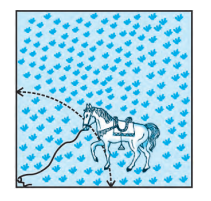
Answer:
The part grazed by the horse is given by = Area of the sector
$Area = \frac{θ}{360°}×πr^2$
= $\frac{90°}{360°} ×π×5^2$
= 19.62 m2
Q8: A horse is tied to a peg at one corner of a square shaped grass field of side 15 m by means of a 5 m long rope (see Fig.). Find (ii) the increase in the grazing area if the rope were 10 m long instead of 5 m. (Use π=3.14 )
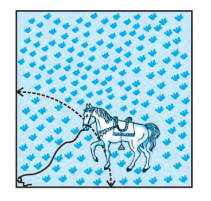
Answer:
When the length of the rope is 10 m, the area grazed will be:-
$Area = \frac{θ}{360°}×πr^2$
$\frac{90°}{360°}×π×10^2$
= 25π m2
Hence, the change in the grazing area is given by :
= $25π − \frac{25π}{4} = 58.85\ m^2$
Q9: A brooch is made with silver wire in the form of a circle with a diameter of 35 mm. The wire is also used in making 5 diameters which divide the circle into 10 equal sectors as shown in Fig. Find: (i) the total length of the silver wire required.
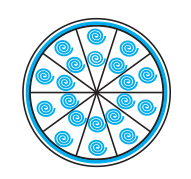
Answer:
The total wire required will be for 5 diameters and the circumference of the brooch.
The circumference of the brooch:-
= $2πr= 2×π×\frac{35}{2}$
= $110\ mm$
Hence, the total wire required will be = $110\ mm + 5×35\ mm = 285\ mm.$
Q9: A brooch is made with silver wire in the form of a circle with a diameter of 35 mm. The wire is also used in making 5 diameters which divide the circle into 10 equal sectors as shown in Fig. 12.12. Find : (ii) the area of each sector of the brooch.
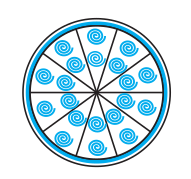
Answer:
The total number of lines present in the brooch is 10 (lines starting from the centre).
Thus, the angle of each sector is 36°.
The area of the sector is given by:
$Area = \frac{θ}{360°}×πr^2$
$Area = \frac{36°}{360°}×π× (\frac{35}{2})^2$
$Area = \frac{385}{4}mm^2$
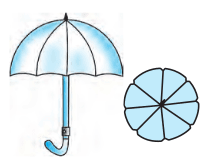
Answer:
It is given that the umbrella has 8 ribs, so the angle of each sector is 45°.
Thus, the area of the sector is given by:-
$Area = \frac{θ}{360°}×πr^2$
$Area = \frac{45°}{360°}×π× 45^2$
$Area = \frac{22275}{28}$
Hence, the area between two consecutive ribs is $\frac{22275}{28}cm^2$
Answer:
The area cleaned by one wiper is:-
$Area = \frac{θ}{360°}×πr^2$
$Area = \frac{115°}{360°}×π× 25^2$
$Area = \frac{158125}{252}cm^2$
Hence, the required area (area cleaned by both blades) is given by:-
= $ 2 × \frac{158125}{252}cm^2$
= $\frac{158125}{126}cm^2$
Answer:
The area of the sector is given by:-
$Area = \frac{θ}{360°}×πr^2$
In this case, the angle is 80°.
Thus, the area is:-
$Area = \frac{80°}{360°}×π× 16.5^2$
$= 189.97\ km^2$
Answer:
The angle of each of the six sectors is 60° at the centre.
(∵$\frac{360°}{6} = {60°}$)
Area of the sector is given by:-
$Area = \frac{θ}{360°}×πr^2$
$Area = \frac{60°}{360°}×π× 78^2$
$Area = 410.66 cm^2$
And the area of the equilateral triangle associated with the segment:-
= $\frac{\sqrt 3}{4}×a^2$
$= 34×282 = 333.2 cm^2$
Hence, the area of segment is: = $410.66 − 333.2 = 77.46 cm^2$
Thus, the total area of design is: = $6×77.46 = 464.76 cm^2$
So, the total cost for the design is: = $0.35 × 464.76 = Rs.162.66$
Q14: Tick the correct answer in the following :
Area of a sector of angle p (in degrees) of a circle with radius R is
Answer:
We know that the area of the sector is given by:-
$Area = \frac{θ}{360°} ×πr^2$
= $\frac{p}{360°} ×πr^2$
Hence, option (d) is correct.
Areas related to Circles Class 10 NCERT Solutions: Exercise-wise
NCERT Solutions of Circles Class 10 Maths Chapter 11 (Exercise 11.1) are provided in the link below.
Class 10 Maths NCERT Chapter 11: Extra Question
Question:
Find the length of the arc if the angle at the centre of the circle of radius 7 units is 60°.
Answer:
Given:
The radius of the circle: 7 units
The angle at the centre is 60°.
Length of arc = $\frac{θ}{360°} × 2πr$, here $r$ is the radius and $\theta$ is the angle at centre.
⇒ Length of the arc = $\frac{60°}{360°} × 2 × \frac{22}{7} × 7=\frac{22}{3}$ units
Hence, the correct answer is $\frac{22}{3}$ units.
Areas Related to Circles Class 10 Chapter 5: Topics
The topics discussed in the NCERT Solutions for class 10, chapter 11, Areas Related to Circles are:
- Areas of Sector and Segment of a Circle
- Summary
Class 10 Maths Chapter 11 NCERT Solutions: Important Formulae
- Circumference of a Circle: 2πr, where r represents the radius of the circle.
- Area of a Circle: πr2, where r represents the radius of the circle.
- Length of an Arc of a Sector:
To find the length of an arc within a sector of a circle, given the radius 'r' and the angle in degrees 'θ', the formula is:
Arc Length = $\frac{θ}{360°}×2πr$ - Area of a Sector of a Circle:
For calculating the area of a sector within a circle with radius 'r' and angle in degrees 'θ', the formula is:
Sector Area = $\frac{θ}{360°}×πr^2$ - Area of a Segment of a Circle: The area of a segment of a circle can be found by subtracting the area of the corresponding triangle from the area of the corresponding sector.
Segment Area = Sector Area – Triangle Area
⇒ Segment Area = $\frac{θ}{360°}×πr^2-(\frac12×r^2\sinθ)$ - When considering the distance (d) moved by a wheel in a single revolution, it is equal to the circumference of the wheel.
Number of Revolutions = Distance Travelled circumference = $\frac{d}{2πr}$
Why are Class 10 Maths Chapter 11 Areas Related to Circles question answers important?
This chapter helps you identify parts of a circle, such as sectors and segments. It teaches us how to apply formulas to solve problems involving circular shapes in real life. These Class 10 Maths Chapter 11 Areas Related to Circles question answers help students learn these methods in a simple and clear way. Here are some more points on why these question answers are important:
- These solutions help you understand how to find areas and lengths of sectors and segments in circles.
- These question answers make it easier to solve real-life problems related to circular designs, fields, and objects.
- These Class 10 Maths Chapter 11 Areas Related to Circles question answers prepare us for higher classes, where we will study advanced mensuration and geometry.
NCERT Solutions for Class 10 Maths Chapter Wise
The links below allow students to access all the class 10 Maths solutions in one place.
Also, read,
NCERT Exemplar Solutions: Subject Wise
After completing the NCERT textbooks, students should practice exemplar exercises for a better understanding of the chapters and clarity. The following links will help students find exemplar exercises.
NCERT Books and NCERT Syllabus
Before planning a study schedule, always analyse the latest syllabus. Here are the links to the latest NCERT syllabus and some of the important books that will help students in this cause.
Frequently Asked Questions (FAQs)
This chapter usually carries significant weightage in Class 10 Board Exams. Questions often involve shaded region problems where formulas must be applied correctly. Also, in higher classes, concepts learned from this chapter are very useful.
Sector:
- A sector includes a central angle and two radii.
- A sector looks like a pizza slice or wedge.
- Centre of a circle is included in a sector.
Segment:
- A segment includes a chord and its corresponding arc.
- It is crescent-shaped.
- Centre of a circle is not necessarily included in a segment.
A sector is the portion of a circle enclosed by two radii and the corresponding arc.
Class 10 Maths Chapter 11 Areas Related to Circles focuses on finding areas of circular figures, including sectors, segments, and combinations of circles with other figures.
Some of the common types of questions asked in this chapter are:
- Finding the area of a sector
- Finding the area of a segment
- Finding the length of an arc
- Finding the number of revolutions of a wheel or the distance travelled
- Using the area and circumference of a circle to find the cost or quantity of material
- Finding the radius of a circle given the area or arc length
Questions related to CBSE Class 10th
On Question asked by student community
HELLO,
I am attaching the link through which you can download and access the Bangalore Sahodaya Class 10th CBSE question paper of Mathematics ( Basic )
Here is the link :- https://school.careers360.com/download/ebooks/bangalore-sahodaya-class-10-mathematics-basic-question-paper-2025-26
It will help you to practice basic level numerical questions, strengthen fundamentals and prepare confidently for the board
HELLO,
Below i am attaching the direct link of Careers360 through which you can download the Bangalore Sahodaya Class 10th Mathematics Basic Question paper 2025 2026
Here is the link :- https://school.careers360.com/download/ebooks/bangalore-sahodaya-class-10-mathematics-basic-question-paper-2025-26
Hope this will help you!
Hello
You will be able to download the CBSE Class 10th Maths Sample Paper 2025-26 using the link which is given below.
https://school.careers360.com/boards/cbse/cbse-10th-maths-sample-papers-2025-26
I hope this information helps you.
Thank you.
Hello,
Here you can access the last 5 years CBSE Class 10 Board Exam Question Papers from the mentioned link below:
https://school.careers360.com/boards/cbse/cbse-previous-year-question-papers-class-10
Hope it helps.
You can check the Class 11 English half yearly question paper and answer key for 2025 26 on the Careers360 website. These papers help students practice, understand the exam pattern, and check their answers for better preparation.
You can visit this Careers360 link to access the English question paper and
Popular CBSE Class 10th Questions
Applications for Admissions are open.
As per latest syllabus. Physics formulas, equations, & laws of class 11 & 12th chapters
JEE Main Important Chemistry formulas
Get nowAs per latest syllabus. Chemistry formulas, equations, & laws of class 11 & 12th chapters
JEE Main high scoring chapters and topics
Get nowAs per latest 2024 syllabus. Study 40% syllabus and score upto 100% marks in JEE
JEE Main Important Mathematics Formulas
Get nowAs per latest syllabus. Maths formulas, equations, & theorems of class 11 & 12th chapters
